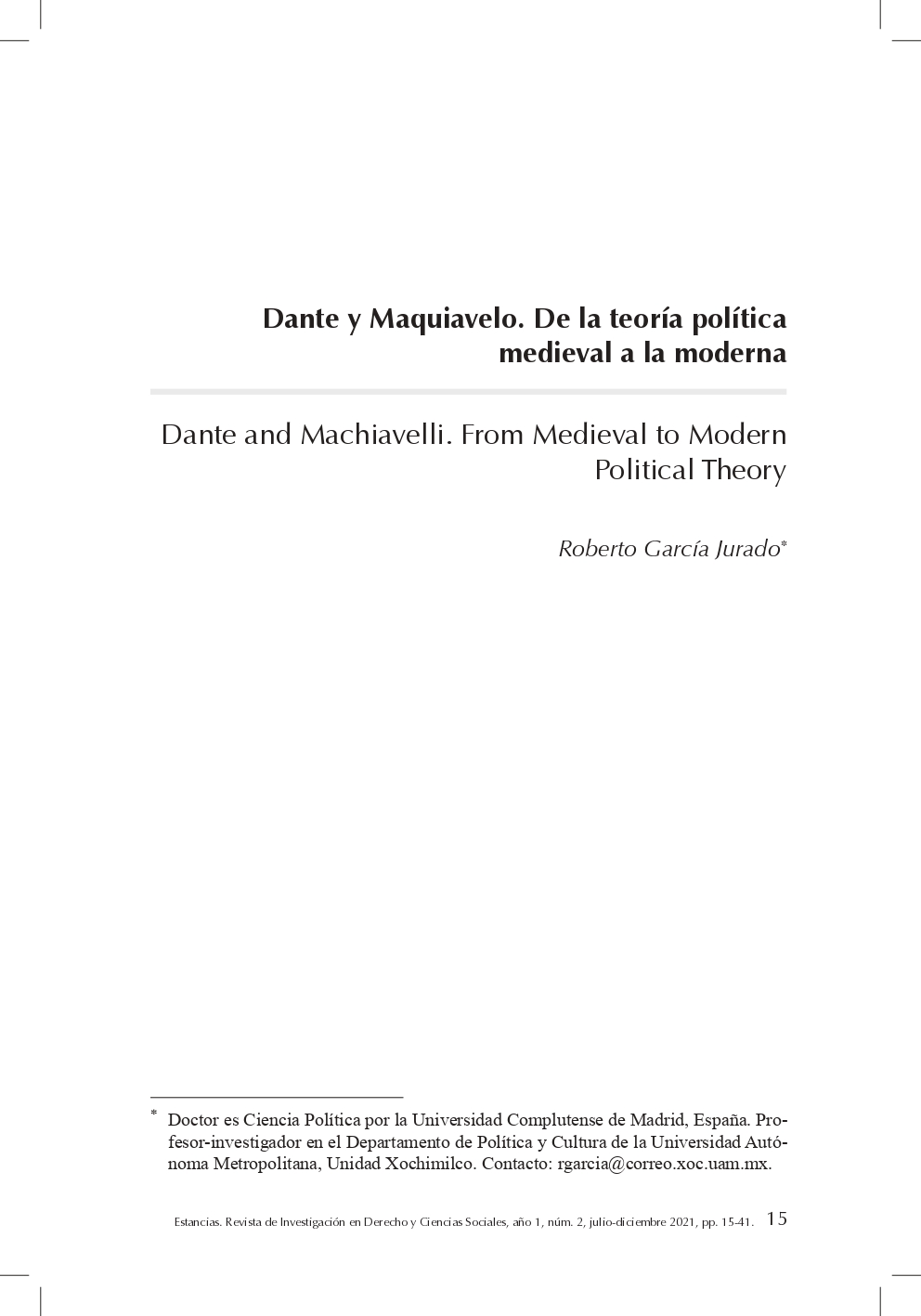Dante and Machiavelli. From Medieval to Modern Political Theory
Main Article Content
Abstract
The life and thought of Dante and Machiavelli have many things in common, even though they are separated by two hundred years of turbulent social and
political transformations. However, they also have notable and profound differences, to the extent that we can locate the former as a typical sample of medieval political theory and the latter of modern political theory. However, it is not proposed to treat Dante and medieval political thought as a puerile stage in the maturation tending to modern political thought, but rather it is presented as a theoretical structure that responded to a reality and different precepts to those that formed time then to modernity. Thus, in this article special attention is paid to the differences in the political thinking of one and the other, especially what has to do with their conception of the political motivations of individuals, the nature of social life and what we could call the international political society, in order to clarify the reasons that allow to place each of them in these different theoretical positions.
Article Details

This work is licensed under a Creative Commons Attribution-NonCommercial 4.0 International License.
How to Cite
References
Alighieri, D. (1948). El convivio. Buenos Aires: Espasa Calpe.
Alighieri, D. (1980). Obras completas. Madrid: Católica.
Alighieri, D. (1986). Vida nueva/ Tratado de la lengua vulgar. Ciudad de México: SEP.
Alighieri, D. (1990). De la monarquía. Buenos Aires: Losada.
Alighieri, D. (2016). Divina comedia. Madrid: Alianza.
Aquino, T. (2004). Gobierno de los príncipes. Ciudad de México: Porrúa.
Balestracci, D. (2017). La battaglia di Montaperti. Bari: Laterza.
Black, A. (1996). El pensamiento político en Europa 1250-1450. Cambridge: Cambridge University Press.
Bocaccio, G. (2000). Breve tratado en alabanza a Dante. Ciudad de México: UNAM.
Bock, G., et. al. (eds.) (1991). Machiavelli and Republicanism. Cambridge: Cambridge University Press.
Compagni, D. (1983). Crónica de los blancos y los negros. Buenos Aires: CEAL.
Crespo, Á. (1999). Dante y su obra. Barcelona: Acantilado.
D’Entréves, A. P. (1952a). Dante as a Political Thinker. Oxford: Clarendon Press.
D’Entréves, A. P. (1952b). The Medieval Contribution to Political Thought. Nueva York: The Humanites Press.
Davis, C. T. (1988). Dante, Machiavelli, and Rome. Dante Studies, (106), 43- 60.
Davis, C. T. (2002). Dante and the Empire. En R. Jacoff (ed.). The Cambridge Companion to Dante. Cambridge: Cambridge University Press.
Eco, U. (coord.) (2016). La Edad Media. I. Bárbaros, cristianos y musulmanes. Ciudad de México: Fondo de Cultura Económica.
Eliot, T.S. (1994). Dante. Tuxtla Gutiérrez: Cifra.
Fedou, R. (1977). El Estado en la Edad Media. Madrid: EDAF.
Figgis, J. N. (1982). El derecho divino de los reyes. Ciudad de México: Fondo de Cultura Económica.
Gierke, O. v. (1963). Teorías políticas de la Edad Media. Buenos Aires: Huemul.
Gilson, E. (2011). Dante y la filosofía. Pamplona: EUNSA.
Gómez Robledo, A. (2005). Dante Alighieri. Ciudad de México: El Colegio Nacional.
Hale, J. R. (2004). Florence and the Medici. Londres: Phoenix.
Haskins, C. H. (1957). The Renaissance of the 12th Century. Nueva York: Meridian.
Hibbert, C. (1979). The Rise and Fall of the House of Medici. Londres: Penguin.
Highet, G. (2018). La tradición clásica. Influencias griegas y romanas en la literatura occidental. Vol. I, Ciudad de México: Fondo de Cultura Económica.
Holmes, G. (1980). Dante. Oxford: Oxford University Press.
Kantorowicz, E. H. (1985). Los dos cuerpos del rey. Un estudio de teología política medieval. Madrid: Alianza.
Kelsen, H. (2017). Lo stato in Dante. Milán: Mimesis.
Le Goff, J. (2018). Hombres y mujeres de la Edad Media. Ciudad de México: Fondo de Cultura Económica.
Maquiavelo, N. (1987). Discursos sobre la primera década de Tito Livio. Madrid: Alianza.
Maquiavelo, N. (2009). Historia de Florencia. Madrid: Tecnos.
Maquiavelo, N. (2010). El príncipe. Madrid: Alianza.
Maquiavelo, N. (2012). Diálogo en torno a nuestra lengua. Madrid: Alianza.
Maquiavelo, N. (2013). Epistolario 1512-1527. Ciudad de México: Fondo de Cultura Económica.
Miethke, J. (1993). Las ideas políticas de la Edad Media. Buenos Aires: Biblos.
Migliorini, B. (2016). Storia della lingua italiana. Milán: Bompiani.
Najemy, J. M. (2002). Dante and Florence. En R. Jacoff (ed.). The Cambridge Companion to Dante. Cambridge: Cambridge University Press.
Nieto Soria, J. M. (coord.) (2016). Europa en la Edad Media. Madrid: Akal.
Ockham, G. de. (2008). Sobre el gobierno tiránico del papa. Madrid: Tecnos.
Padua, M. de. (2009). El defensor de la paz. Madrid: Tecnos.
Peterman, L. (1982). Dante and the Setting for Machiavellism. The American Political Science Review, 76 (3), 630-644.
Peterman, L. (1990). Gravity and Piety: Machiavelli’s Modern Turn. The Review of Politics, 52 (2), 189-214.
Peterman, L. (1987). Machiavelli’s Dante & the Sources of Machiavellianism. Polity, 20 (2), 247-272.
Petronio, G. (1990). Historia de la literatura italiana. Madrid: Cátedra.
Rendina, C. (2011). I papi. Da San Pedro a papa Francesco. Roma: Newton Compton.
Romano, E. (2001). On the Rule of Princes (Selections). En A. S. McGrade, et. al. (eds.). The Cambridge Translations of Medieval Philosophical Texts. Vol. 2. Cambridge: Cambridge University Press.
Ullman, W. (1965). A History of Political Thought: The Middle Ages. Harmondsworth: Pelikan.
Villani, G. (1967). Crónicas florentinas. Buenos Aires: CEAL.
Viroli, M. (2009). Il sorriso di Niccoló. Storia di Machiavelli. Bari: Laterza.
Vivanti, C. (2013). Maquiavelo. Los tiempos de la política. Barcelona: Paidós.
Wood, E. M. (2011). De ciudadanos a señores feudales. Madrid: Paidós.
